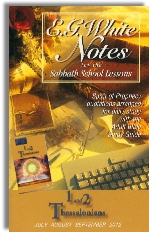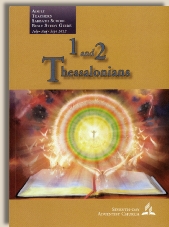|
||||||||||||||
Commentary on "Preserving Relationships"
Day 1: Sabbath Afternoon, July 7, 2012 - Introduction
Overview
This week’s lessons discuss the title idea: “preserving relationships”. Author John Paulien takes a day to look at Paul’s time in each of four cities: Thessalonica, Berea, Athens, and Corinth, and he concludes by discussing Paul’s heart for the Thessalonians.
The Teachers’ Comments, on page 25, identify the problem that needs addressing: how to keep new converts from disappearing “out the back door. More often than not the problem is not that the new believers stopped believing but that they never really felt part of the church.”
This week’s lesson is primarily designed to address the issue of how Adventist members should approach unbelievers and how to develop deep and lasting relationships with converts from different backgrounds.
Observations
There are two things that need to be addressed before continuing through this week’s lessons. First, the question of how to keep new converts from leaving “out the back door” is not simply a matter of older members befriending the newbies. Second, behind the presentation of these lessons which ostensibly explicate 1 and 2 Thessalonians, there is Paulien’s non-articulated but shaping belief that Adventists are called to negotiate a unifying of the three “separated” fragments of monotheism: Christianity, Judaism, and Islam.
First, the concern in this lesson over those who are converted to Adventism only to leave quietly out the back door grows out of the complete lack of Adventism’s understanding of being born again. People who are born again must first hear the biblical gospel, and Adventism does not teach the biblical gospel. Stated succinctly in 1 Corinthians 15:3-4, the gospel is simple: Jesus died for our sins according to Scripture; He was buried, and He rose on the third day according to Scripture.
Jesus died for human sin and took the wrath of God for sin; when we place our faith in Him and repent, we are transferred from death to life (Jn. 5:24), taken from the domain of darkness and placed in the kingdom of God’s beloved Son (Col. 1:13). At that moment we are sealed with the Holy Spirit (Eph. 1:13-14), and we are born again of the Spirit as Jesus explained to Nicodemus we must be born in order to see the kingdom of God (Jn. 3:3-6).
People who are not taught the pure, simple gospel of Scripture will not be born again. “Faith comes from hearing, and hearing by the word of Christ” (Rom. 10:17). Adventism does not teach the biblical gospel, and “converts” to Adventism are accepting a unique package of doctrines. This package based on the doctrines endorsed by the visions of an extra-biblical prophet will not result in people being born again.
In many cases it is inevitable that people will leave after joining; they have no real heart change, and the doctrines are unfamiliar and so is the related lifestyle. Trying to keep people “in” by befriending them will not work long-term because such friendship is based on human motives and fails to address the hunger that drives people to search for truth in the first place. A false gospel can never satisfy the spiritually hungry heart.
Jon Paulien speaks on the remnant
Second, I believe that understanding Paulien’s underlying conviction about the great controversy and the remnant will help the reader to grasp his purpose in writing this lesson.
In 2008 the Ohio Conference of Seventh-day Adventists hosted a weekend convocation in honor of the 150th anniversary of Ellen White’s Great Controversy vision. The weekend was called “The Love of the Ages”, and Jon Paulien gave a talk that weekend entitled “Paul, the Remnant, and the Great Controversy”. In his talk Paulien developed his thesis that the “eschatological remnant” is “bigger, more international, and more unpredictable” than anyone imagines.
Paulien says there are three classifications of “remnant”: the historic remnant, the faithful remnant, and the eschatological remnant. He uses texts primarily from Isaiah and some from Ezekiel to build his point from an Old Testament perspective. Then, he presents Ephesians 1:3-14 to explain that Paul presents an eschatological remnant that will demonstrate unity among people of wildly diverse backgrounds and religions.
In fact, Paulien says, in a preliminary interview with Karl Haffner, “If you’re not probing the Islamic world and the Buddhist world and the Catholic world and the orthodox world—if you’re not probing those areas for kindred spirits that God is already speaking to, then I don’t think you’re fulfilling the great controversy vision.”
As he distills his point out of his ground-laying explanations, Paulien presents the idea that early on, Christianity was separated from Judaism illegitimately. He points out that Islam says that when someone separates or otherwise gets rid of a religion, everyone loses something. Therefore, he says, quoting liberal theologians who have developed and supported this idea, Christianity was not intended to be a separate religion. When early Christians separated from Judaism both Christianity and Judaism lost something.
Moreover, this separation and loss gave rise to Islam. Islam came, Paulien says, and he quotes from the Quran to demonstrate that Islam teaches that the prophets of Judaism and Christianity—including Jesus—are to be respected as equals with Mohammed. He further explains that, according to the Quran, Judaism and Christianity are valid expressions of Islam and that Islam believes in “no forced conversion”.
Finally, Paulien says that the fracturing that occurred between Judaism, Christianity, and Islam will be repaired when the eschatological remnant is revealed. He says that remnant will be a uniting of these three religions, and each will bring its unique emphases to the whole. Christianity, he says, emphasizes Gospel, Grace, and Jesus. Judaism emphasizes Law, Obedience, and Sabbath, and Islam emphasizes Submission, Judgment, and Eschatology.
Paulien says that right now these three look at each other and say, “Wrong!” But, citing Ephesians 1:9-10, he says God’s goal “for the end time is to unite the universe in Christ”.
Eastern Religion
Paulien further posits that Christianity began as an eastern religion, became westernized and influenced by Greek thought as it moved into Europe, and now it is returning to its roots, becoming an eastern religion again, as it was originally intended to be.
Paulien also says that when he lived in the Middle East, many Muslims did not see him as a Christian. “That bothered me,” he said, but then he realized that Muslims disagree with Christians over lifestyle issues, and Adventists share these lifestyle convictions with Muslims. He said the division between Christianity and Islam in the Middle East occurred over alcohol, pork, modesty, their views of Christian history, and the issue of submission/obedience. Christians, Islam says, are known to be lax, and Muslims are strict.
He further said that the Great Controversy is one of the great uniting factors Adventists share with Muslims. Paulien said, “One of the clearest places outside of Ellen White where the Great Controversy can be found is the Quran.” He states he was “shocked” at “how much there is about Satan and about good against evil” in the Quran, and he says that, as it’s described in the Quran, he calls this theme “cosmic jihad”.
Paulien concludes his talk by discussing Adventism’s unique position and relationship with the eschatological remnant. He says Adventism’s place is a balance between “identity and humility”. Adventists are “bearers of a vital and unique message”. Theirs is “a divine calling and history,” and there is “no greater mission in the universe.” He states that Adventism has a “unique position among world religions”, yet none of these unique facts gives Adventists a reason for boasting or arrogance, because simply being part of the historic remnant group does not ensure that one is a part of the “faithful remnant”.
Flawed Assumptions
Paulien’s remnant theology is flawed from the start. Christianity has never lost anything. Jesus said that He would build His church on the rock of Peter’s declaration that Jesus was the Christ, the Son of the Living God, and that the gates of hell would not prevail against it. No human politics or rationalizing would destroy the church or the truth of God’s word.
If one reads Scripture and abandons extra-biblical prophets, the gospel is very clear. Moreover, it is very clear how one is saved and how God is uniting the universe in Christ. The power that changes all reality is Jesus’ own blood shed for sin. When we place our faith in the Lord Jesus as our Substitute, He makes us alive and hides us in Him. We are baptized into His body by the indwelling Holy Spirit, and God unites all who believe in Himself and gives us all His Spirit.
Those who are saved by faith are defined by one thing only: they are born of the Spirit when they believe in the Lord Jesus. The unique observances of the world religions have nothing to do with “the remnant”.
The one thing that matters is believing in Him. “He who believes has eternal life,” Jesus said (Jn. 6:47).
Moreover, Paul’s letters to the Thessalonians and Luke’s accounts of Paul’s visits to the cities where he preached are not object lessons demonstrating strategies for building relationships. Rather, these passages are all written to reveal the work of God in our salvation history. Furthermore, they give us instruction about how to live as believers in a hostile world.
As we look at this week’s lessons, it is important to understand that the author of the quarterly, Jon Paulien, is teaching from a perspective of moving Adventists toward an open stance of seeing common purposes between themselves and Muslims and orthodox Judaism. He is moving them toward believing they all worship the same God.
Paulien’s perspective is not biblical.
Read the Scripture passages in context, and ask God to teach you what He wants you to know.
Summary
- Adventist converts leave “through the back door” not because they lack friends but because Adventism does not feed their hungry heart-longings, and they are not born again.
- Paulien has an “agenda” of helping Adventists come to understand Adventism as being sympathetic to and helpful to Islam.
- Paulien believes the eschatological remnant will include Christianity, Judaism, and Islam and states that each emphasizes unique teachings.
• Christianity: gospel, grace, Jesus
• Judaism: law, obedience, Sabbath
• Islam: submission, judgment, and eschatology
- The great controversy, according to Paulien, is found primarily in two places: Ellen White and the Quran.
- Paulien calls the Quran’s description of the struggle between good and evil “the great jihad”.
Copyright 2012 BibleStudiesForAdventists.com. All rights reserved. Revised July 6, 2012. This website is published by Life Assurance Ministries, Camp Verde, Arizona, USA, the publisher of Proclamation! Magazine. Contact email: BibleStudiesForAdventists@gmail.com.
The Sabbath School Bible Study Guide and the corresponding E.G. White Notes are published by Pacific Press Publishing Association, which is owned and operated by the Seventh-day Adventist church. The current quarter's editions are pictured above.
Official Adventist Resources
Standard Edition Study Guide Week 2
Teacher's Edition Study Guide Week 2
Easy Reading Edition Study Guide Wk 2
Search the Complete Published Ellen G. White Writings
Please Support This Project


